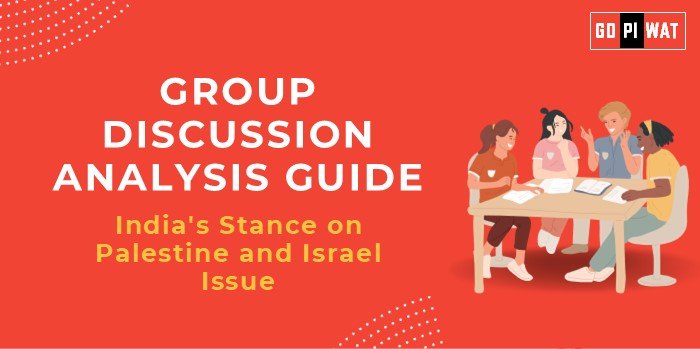📋 Group Discussion Analysis Guide on India’s Stance on Palestine and Israel Issue
🌐 Introduction to India’s Stance on Palestine and Israel Issue
India’s foreign policy regarding the Palestine-Israel issue has been complex and evolving, reflecting its aspirations on the global stage. The topic is significant for B-school discussions due to the intricate balance India seeks between strategic interests in the Middle East and ethical alignment with its long-standing support for Palestine.
📜 Topic Background
Historically, India was one of the first non-Arab countries to recognize the Palestinian Liberation Organization (PLO) and has traditionally supported Palestinian statehood based on its non-aligned stance. However, since establishing formal diplomatic relations with Israel in 1992, India has fostered close economic and defense ties with Israel while carefully supporting the Palestinian cause in international forums.
📊 Quick Facts and Key Statistics
- 💼 India-Israel Bilateral Trade: Exceeds $6 billion annually, with significant defense and technology exchanges.
- 🗳️ UN Voting Record: India has generally supported resolutions favoring Palestinian self-determination.
- 📊 Public Opinion in India: Surveys indicate public division, with support often split along political lines.
- 🔍 Recent Diplomatic Moves: India abstained from a few UN resolutions criticizing Israel but still supports a two-state solution.
👥 Stakeholders and Their Roles
- 🇮🇳 Indian Government: Balances diplomatic relations with both Israel (for defense and technology) and Palestine (due to historic and political alignment).
- 🇮🇱 🇵🇸 Israeli and Palestinian Governments: Represent the primary interests and national aspirations of each side.
- 🗣️ Indian Citizens and Political Groups: Different political groups and citizens’ opinions influence the public stance.
- 🌍 International Community: The U.S., Middle East nations, and the UN play pivotal roles, impacting India’s diplomatic choices.
🏆 Achievements and Challenges
✨ Achievements
- 🤝 Strategic Partnerships: India has developed strong economic and military partnerships with Israel.
- 🕊️ Moral Diplomacy: India maintains its principled stand on Palestinian self-determination, aligning with its historical values.
- ⚖️ Balanced Foreign Policy: India’s relationship with both parties reflects its balanced diplomatic approach.
⚠️ Challenges
- 🎭 Political Sensitivity: Balancing relations with Israel while supporting Palestine often leads to domestic and international criticism.
- 🌐 Regional Instability: Middle East conflicts complicate India’s position and its energy security.
- 📉 Global Comparisons: Countries like Egypt and Jordan also balance relations with both sides but face less scrutiny than India.
🗨️ Structured Arguments for Discussion
- 💬 Supporting Stance: “India’s stance is pragmatic, balancing moral and strategic interests, allowing it to maintain relations with both Israel and Palestine.”
- ❓ Opposing Stance: “By balancing between Israel and Palestine, India risks appearing indecisive, possibly weakening its diplomatic influence.”
- ⚖️ Balanced Perspective: “India’s dual support shows a nuanced policy that seeks stability in the region while upholding its historic values.”
💡 Effective Discussion Approaches
- 📜 Opening Approaches:
- “India’s relationship with Palestine dates back to its non-aligned movement.”
- “With $6 billion in trade with Israel, India balances economic interests with historic values.”
- “India-Israel defense cooperation has grown despite India’s continued support for Palestinian rights.”
- 💬 Counter-Argument Handling:
- “India’s support for Palestine does not mean an anti-Israel stance; rather, it highlights India’s diplomatic flexibility.”
🔍 Strategic Analysis of Strengths and Weaknesses
- 💪 Strengths: Strategic partnerships with Israel, strong support for Palestinian rights, non-aligned foreign policy tradition.
- ⚠️ Weaknesses: Potential for criticism from both sides, dependency on Middle East for energy, difficult diplomatic balancing act.
- 📈 Opportunities: Economic and technology cooperation with Israel, peace diplomacy in Middle East.
- ⚡ Threats: Risk of backlash from either side, regional instability affecting relations, domestic criticism.
📚 Connecting with B-School Applications
- 🌍 Real-World Applications: Valuable for projects on international relations, diplomacy, trade, or conflict resolution.
- 🎤 Sample Interview Questions:
- “How can India’s relationship with both Palestine and Israel benefit its international strategy?”
- “Evaluate the risks and rewards of India’s stance on the Israel-Palestine conflict.”
- 💡 Insights for B-School Students:
- Importance of balancing ethics with strategic interests.
- Role of historical alliances and modern diplomacy in international relations.


